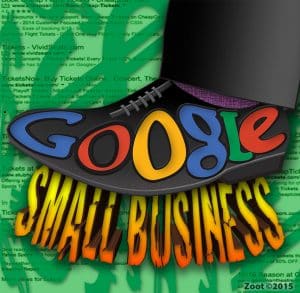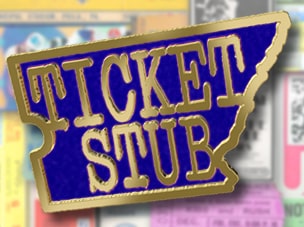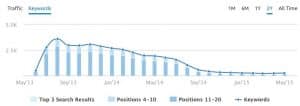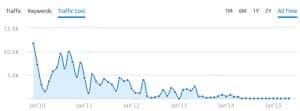May is small business month, so as a follow-up to a blog post I wrote recently, I tracked this small business owner, Ira Zoot from TicketStub.com, and interviewed him. Mr. Zoot originally claimed that he, as a small business owner, has been crushed by Google. He’s been only for over 10 years, and, in the past several years Google has taken steps through various algorithm changes and other policies, to crush his business online.
Bill Hartzer: What’s your name what kind of small business do you own?
My Name is Ira Zoot and I’ve owned Ticketstub.com for the last 12 years + which is an online ticket reseller of premium and sold out event tickets.
Bill Hartzer: How long have you been using Google for your business needs?
I’ve been using Google for Ticketstub.com for the last 12 + years and had been using Google on other projects for years before that.
Bill Hartzer: Do you use any other media/social outlets to market your business?
Of course, I use Facebook, Twitter, LinkedIn, Google Plus as well as more traditional offline marketing methods. I am working toward doing a much more intensive social media marketing campaign to go along with the marketing done with Google, Bing, Yahoo and other online resources.
“You shouldn’t have relied solely on Google for your traffic and revenue”
Something I keep hearing from people is … “You shouldn’t have relied solely on Google for your traffic and revenue”. Well, I didn’t but the fact of the matter is as an online Ticket reseller I need to be highly visible. Those people who are most interested in buying tickets primarily use Google. Google holds the market share for search and it is where serious customers who more often convert are looking.
Any business that is solely online needs to find the best demographics to make it’s products or services visible them. Which in my case it means Ticketstub.com needs to be well ranked on Google. Also, on the other search engines, social media and other channels as they are important as well but they can’t replace the eyes I get from Google.
Bill Hartzer: Has your business suffered from the various changes to the search algorithms Google has made? If so, how has it suffered?
Ticketstub.com has seen an almost 70% traffic and revenue hit, starting at the beginning of 2013 and hitting that low by May 2013. Never recovering from that point on to today. Whatever it was that Google thought was so terrible effectively removed or demoted my rankings from all the most important keywords and strings for performers, events, venues for my business.
I think it’s needed to say that I’m not a search engine optimization expert by any stretch nor am I just some whiny “sore loser”. I’m just a small business person who’s worked very hard for 12 years to build a trusted, successful web business (as a ticket reseller affiliate ) who was affected by these updates in a massively destructive manner. Up until these last couple years being an SEO guru/expert wasn’t something that was required to rank well as long as you did the best you could to honestly get your site out there.
The above isn’t an excuse. I do take ownership of my “failings” … I wasn’t as diligent on checking these things due to my lack of SEO knowledge and the ongoing success of the site/business in spite of that. There was never any other overly apparent indications there were any serious site issues existed — as business was as good as ever.
We never had any warnings or penalties on the site by Google. If I had it would have gotten me to move quickly to address them. So, the needed website improvements slipped by me until I starting seeing significant traffic declines and revenue losses and by then it was too late to do anything about them.
The average traffic for Ticketstub.com® prior to Google’s “quality” updates was approximately 1500-2000 visitors a day, and during the last holiday season 2000-3000 visitors a day. Ticketstub.com had a yearly gross revenue in the low to middish $7 figures consistently for most of it’s existence.
Gross revenues that any small business would be extremely proud — or for that matter any brick and mortar business would be extremely proud of. The majority of my sales coming from organic search engine traffic with a small percentage coming in from the Google AdWords campaigns I had been running. Which btw … I haven’t been able to afford to do any paid advertising for the past year and a half as a result of the devastation to my business.
Another thing Google was/is allowing massive competitors to infringe on my registered US Trademark 96% of the time for over 9 years now. Requiring me to burn through my ad budget too the tune of just under a million $ over 9 years just to stay close on my own exact match trademark. I guess I was a quality enough business for Google to take my money for ads.
For those who don’t understand why companies have trademarks on their brands or what it is. A simple definition would be: It’s a symbol, word, or words that are legally registered with the USPTO (USA) or established by use as representing a company or product. Protecting that brand legally from misuse or profit by other than the TM holders.
Google claims allowing other companies to bid on competitor’s TM’s “creates competition”. However, it eludes me how small businesses like mine can be “competitive” with corporations that spend more in one day on Adwords than we have per month … but I’ll leave this for another time.
After Google turned Ticketstub.com into “collateral damage”, I’m lucky if I see 200 visitors a day on the site. Fortunately, my mobile apps have been getting traffic and have been one of the factors keeping Ticketstub.com alive. But due to the massive lost revenue, the monies having to be expended trying to figure out why this happened yet alone how to fix the site has left my business and personal finances hanging on for dear life.
I’ve basically hit a wall financially … I’m having to sell other business assets in order to raise money to pay for all the development work, the SEO, the marketing that I can’t do myself. It’s at the point I can’t even get other sites started to bring in new revenue as doing that all costs sizable amounts of cash which I no longer have.
Now, Google is essentially requiring people to be SEO experts as well as coding experts. Things that regardless of how much I want to be those things there isn’t enough time in the day for me to effectively learn them. There is no way anyone who isn’t an expert can keep up with these intensive new requirements and even then it’s extremely difficult to do. Up until the recent Mobile updates Google rarely if ever bothered publicly making information available in a time frame that would have allowed so many site owners like myself get anything changed and save our livelihoods.
It’s understandable … to a point … as Google doesn’t want to give those people who are “gaming the system” a heads up on how to hack the new algorithm. The problem with that is that it leaves the “regular folks” and even the SEO experts in the dark on how to effectively comply with those changes and not end up being negatively affected.
Those companies that haven’t been hit as hard or at all are those with SEO teams on staff or that have the budgets to hire SEO agencies to monitor and update their site. How is it that a small business owner that as a result of this experience is either completely broke or left with barely enough to cover their bills can hire this now required staff?
Simple answer … we can’t and Google doesn’t have the decency to offer even the slightest real assistance to those of us they called “collateral damage” who are willing to do whatever is required to comply. We obviously don’t even count for anything to Google.
Bill Hartzer: Do you understand why Google goes after web spam so intensely?
For those who don’t know what “WebSpam” is: Webspam (also referred to search spam) is a phrase used to describe webpages that are designed to “spam Google search results” using SEO tactics that are against Google publishers guidelines. Pages that use webspam to improve search engine results page (SERP) rankings typically use black hat SEO tactics such as keyword stuffing or cloaking, the latter of which involves employing misleading redirects and/or doorway pages of websites.
Of course I understand what it is. I’ve been working on the internet in one form or another since I got my first domain in 1995. Its no secret that there are people who are “blackhatting” gaming the system for ranking/traffic and the revenue that comes with it. I understand that there have been and still are “affiliates” out there doing lots of unacceptable things to get traffic and sell whatever they sell.
I have never subscribed to doing those things with Ticketstub.com.
I dedicated myself to building an honest, trusted, popular brand/business when I first set up a ticket site. Over the decade + before getting crushed I achieved and smashed through my goals. This is/was easily supported with 10 years of Google Analytics, statistic and revenue data … which Google didn’t care to make an effort to look at even after I literally begged them too.
“Google is unfairly setting “rules” flatly across the board for all sites.”
Google is unfairly setting “rules” flatly across the board for all sites. Google seemingly took nothing into account about how different types of websites/verticals have different “quality requirements” and needs than their sweeping flatline determination of what’s quality or not. They assured that many small businesses like mine were going to be crushed by their updates.
For instance, my customers have very uncomplicated needs from Ticketstub.com.
`
1) They come to the site knowing what event they want to attend.
2) They look at our inventory for tickets that work for them.
3) They select those tickets and go to our checkout … pay for those tickets and they leave.
Our customers have no interest in hanging out on Ticketstub.com to read the news, performer information, sports scores or to watch videos. There are specific sites that offer those things much more effectively since those are their main focus. My customers come/came because they liked my brand/site, the way I did business in an honest manner the way I would want to be treated. Those things being required on Ticketstub.com now by Google just serve to distract customers from buying tickets … which for a retail site … it’s a bad model to be made to follow.
Obviously to me, in part Google was/is prejudging my/any affiliate ticket website with a similar inventory feed as being duplicated spammy, garbage of no value to searchers. In my case, completely without taking any details/realities of Ticketstub.com®’s long standing business into account when ranking or penalizing which makes their judgment erroneous.
This “prejudice” against affiliates is nothing new either. DMOZ lived by this erroneous opinion, Wikipedia as well, by thinking that “all affiliate ticket sellers are garbage”and therefore aren’t allowed pages talking about their history. Again, never taking any of the details or realities of each ticket seller website into account.
Granted as mentioned above, there is a multitude of affiliate websites that are crap and do game the system. But the reality is that all of them aren’t subscribing to these deceptive and unacceptable practices being attributed to them. Ticketstub.com® has never been nor ever will be one of those kinds of affiliate ticket websites, as my 12 year history clearly shows.
In reality, all of the major Ticket resale/broker sites are “affiliates”. In that they integrate the same various broker feeds and sell inventory they don’t own but get a % of the sales just like us. They sell the same products in the same markets to the same people.
How is that different than what my affiliate ticket business does? It’s not. Of course, my site Ticketstub.com is on a much smaller scale. What does set me apart from them … is I don’t have the budget to pay for full time SEO or hire a firm to do my SEO and police my site 24/7 or spend the fortune on Adwords chasing companies that have massively bigger ad budgets than I do.
A “real world” example would be Sam’s Club, Costco, Walmart, Target all being treated as affiliates. Why? Because all of these “big brands” sell the same products at essentially the same prices in the same markets. But still people choose the particular business they’ve come to trust and who they’ve found something they like about them better than the others to go buy those products at. Which means even tho these business have the same products they still offer something which their customers value causing them to choose that business over the others.
It’s absolutely no different than my surviving and thriving in a brutal niche like ticket sales. I offered and delivered what my customers wanted and expected, so they come back and they tell others of the good experiences they had with my business. My offering similar inventory doesn’t diminish the quality of my business anymore than having similar inventory diminishes the quality of the above big brand stores.
Just because Ticketstub.com has an inventory feed from an aggregator that others utilize as well doesn’t mean should be shot down or excluded as spammy garbage. Just popping a feed on a site and calling it a business does not a business make. All the above is a pretty solid indication Ticketstub.com® isn’t a spammy, duplicate template ticket website.
Ticketstub.com is a business that deserves fair treatment, fair notice and a reasonable timeframe to comply with massive changes. What Google has done to my site and some many other honest small business owners is immoral and unethical in not giving us a reasonable chance to comply. Google has destroyed many thousands of small businesses and their future with unreasonable search algorithms which don’t look at most of the important facts about the verticals they serve, the site history that actually determine the facts and whether trashing it is justified.
Worse is Google has made no efforts whatsoever to offer assistance to those of us who were “collateral damage”. Basically telling us tough luck go figure out how to comply or go hire people who can do that for you. Easy for Google to say … they didn’t just have their income ripped out from under them and no longer have the financial or knowledge resources.
So … sure. I understand why Google goes after spammers as hard as it does. They deserve it and Google has every right to do that. But to call legitimate businesses/sites like mine spam and without value based on no detailed, factual information is pure nonsense. Google destroyed many thousands of legitimate websites owned by honest, hard working small business owners like myself who never spammed anything or anyone … who’s livelihoods depended on these sites isn’t just wrong … it’s evil.
Bill Hartzer: Do you think Google have gone too far in their punishments in sweeping manner that not only effects spammers but a multitude of sites that weren’t engaging in those practices or just weren’t SEO experts?
That’s an easy one. Absolutely and positively … yes.
Bill Hartzer: Do you think Google does enough to help businesses they called “collateral damage” get back rankings they were erased from so they can continue to do business and grow?
This is another easy one. Absolutely not … Google in my experience couldn’t care less about helping people like myself that were undeservedly devastated. I tried many channels including getting my story to Matt Cutts … (who I have no idea if he even read it … but I was able to see that he or someone working his mail opened mine. ). The best I ever got was from a Google press agent telling me there is nothing they can do to help and referred me to a faq link. Which was worthless in what it offered.
Google could have prevented all of the devastation by simply offering a simple site where one could enter their url and it could be checked against the new algorithms. There are a number of sites that became available way after the fact put out by non Google companies to both assist people and too sell recovery services.
I can’t believe that a company like Google that hires some of the smartest people in the world … could have “mistakenly” caused all this havoc for small business owners like me. I think it was just a matter of it being easier to just disregard us as the “collateral damage” they called us and shrug off all of our pleas for help as insignificant to the “bigger picture”. Legally they are untouchable, so they have been able to do whatever they wanted without any accountability, consequences or for that matter morals or ethics. The larger companies are loving this … Google wiped out or set back pages in rankings the smaller competitors with some clicks on the keyboard.
Bill Hartzer: Have you found yourself able to get your site to recover without using Google as a main source of traffic that converts? Have you been able to get your site to recover in general regaining traffic and revenue that was lost?
At this point … I have been able to mostly stop the “bleeding” and if not for my mobileapps and site I would have been bankrupt at this point. Over the last 2 years I’ve tried a multitude of things to get things back on track and none of those helped.
Through lots of hand holding and diagnosis I’ve been made aware that there are a number of issues that need to be addressed and I am doing my best to do that.
I’m still in the dark as to what Google could call a negative since they won’t tell me what the initial causes were. I’m going to have to have the site extensively audited, then have to the developer go in and fix everything that’s found in the audit. Then, once that’s done I need to hire an excellent SEO to get things back on track & then monitor the site. Then comes my having to bang away on social media and will likely need to hire a firm to get the saturation that is needed there.
Which is all going to cost me a small fortune requiring me to sell assets and with no guarantee it will make a difference at all. I’ve considered just starting with a fresh site from the ground up but I’m concerned I will just make matters worse as paths will change yet again. I’m just a small business owner with limited resources that has been driven to the brink of madness by this experience.
I am bound and determined to regain & further my business traffic, revenue and visibility pretty much regardless of what it takes. I built and delivered a high quality thriving service before and I’ll do it again. Though … it would be better than great if Google would work with me to reconsider the automated slashing that I’ve been dealt what I truly believe to have been unjust or if preferred … that my business was “collateral damage” of these updates.
Bill Hartzer: Do you feel that Google “owes” you good ranking/position?
Of course, I’m aware, Google can do whatever it wishes. Google is totally in the drivers seat and I am at their mercy. Not thrilled about that, but over the last couple of years I’ve come to accept as it’s part of the business. I appreciate what being included in Google’s search results offer in value and exposure to my business and myself. That being said … I spent over a decade playing by the rules doing the best I can, never getting a warning or penalty and creating a trusted business and brand. So, I’d like to think that given the documented track record of my site I’ve at least earned the ranking I had previously.
Bill Hartzer: If you could offer Google some advise concerning these issues what would it be?
I realize as many other online business owners do … that Google is really the “only game in town” and being excluded will make it almost impossible to survive yet alone thrive.
Being that Google does control the search market to the level it does … I think they should consider the moral, ethical side here … not just the profits or board members. In my opinion unethical, immoral and “corporately evil” to destroy small businesses and lives of these small business owners like me. People who’ve dedicated themselves to working ridiculously long hours, sacrificed many things to build their business, don’t have the resources of the large corporations and have shown the desire to do whatever is within their means to comply with Google.
Especially in an economy that is as way down and extremely difficult for small business as is the current economy. Google should care more about those like myself that have been so loyal, dedicated and have contributed to the growth of Google.
Google should stop thinking only about the large corporations with the very deep pockets and remember that the “little guys” are no less important. That or change their motto from “Don’t be evil” to “gimme the money”.
Bill Hartzer: Thanks Ira, for telling me your story about TicketStub.com, and for allowing me to get more awareness about small businesses. I know it’s been tough for small businesses to continually adapt to Google’s changes in their algorithms and policies.




